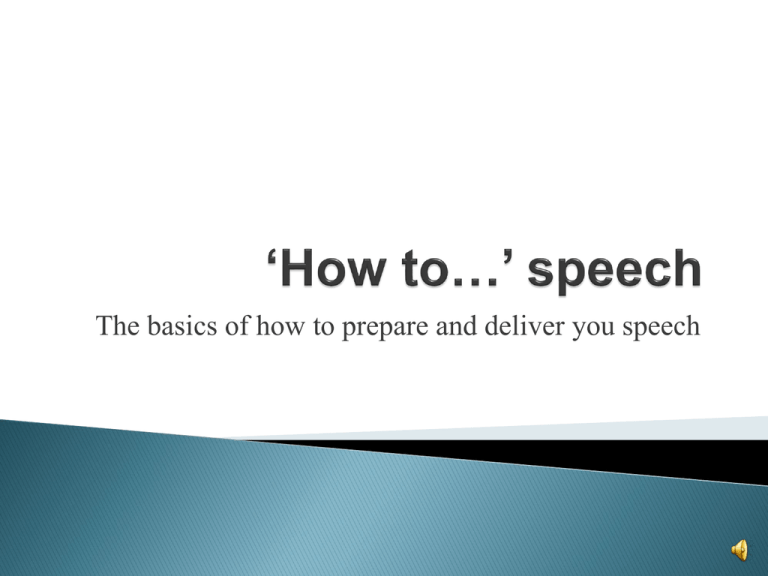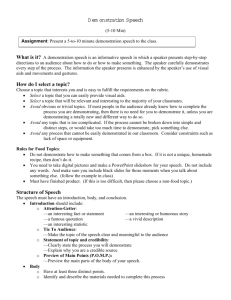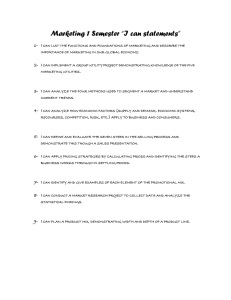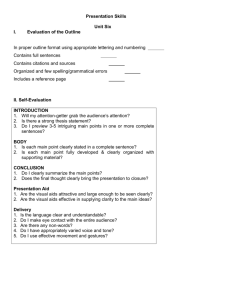How to speech ppt
advertisement

The basics of how to prepare and deliver you speech A How to speech is a demonstration speech in which a speaker presents step-by-step directions to an audience about how to do or how to make something. The speaker carefully demonstrates every step of the process. The information the speaker presents is enhanced by the speaker’s use of visual aids, movements and gestures. Choose a topic that interests you and is easy to fulfill the requirements on the rubric. • Select a topic that you can easily provide visual aids. • Select a topic that will be relevant and interesting to the majority of your classmates. • Avoid obvious or trivial topics. If most people in the audience already know how to complete the process you are demonstrating, then there is no need for you to demonstrate it, unless you are demonstrating a totally new and different way to do so. • Avoid any topic that is too complicated. If the process cannot be broken down into simple and distinct steps, or would take too much time to demonstrate, pick something else. • Avoid any process that cannot be easily demonstrated in our classroom. Consider constraints such as lack of space or equipment. • Do not demonstrate how to make something that comes from a box. If it is not a unique, homemade recipe, then don’t do it. • Must have finished product. (If this is too difficult, then please choose a non-food topic.) The speech must have an introduction, body, and conclusion. • Introduction should include: o Attention-Getter: —an interesting fact or statement —an interesting or humorous story —a famous quotation —a vivid description —an interesting statistic o Tie To Audience: —Make the topic of the speech clear and meaningful to the audience o Statement of topic and credibility: —Clearly state the process you will demonstrate —Explain why you are a credible source o Preview of Main Points (P.O.M.P.): —Preview the main parts of the body of your speech. Have at least three distinct points. Identify and describe the materials needed to complete this process What are they? Where can one find them? Think about alternatives. Include an explanation for each step involved: Make sure steps are in chronological order. Define any terms that might be unfamiliar to your audience. Think of alternatives to the steps mentioned? What is some relevant background info/history on topic? Summary of Main Points (S.O.M.P.): – restate the points that you presented. Round-off: end by returning to your attentiongetter. 1. View video of the How to perform Rabbit Showmanship as a model of the lesson. 2. Create your How-To speech: Use the How-To speech outline template or write your own. Post your completed outline (include your brainstorming notes for extra credit). 1. Decide on a topic that fits the criteria. Brainstorm if it helps 2. Make a list of required material and from where one can obtain this material. 3. Make a list of steps. Think of alternatives. 4. Write your speech outline, using the Rabbit Showmanship as a guide. 5. Remember to have transitions. 6. Review 'Structure of How-To Speech' if need be. 7. Practice, practice, practice. Time your speech. Find an audience or rehearse in front of a mirror Time: your speech should last between 5-10 minutes. Points will be deducted for time over and under. 3. Prepare either an audible Power Point or a Video/movie of you performing your speech and post it under assignments. If you need to take digital pictures and make a PowerPoint slideshow for your speech do not include any words. And make sure you include black slides for those moments when you talk about something else. Choose a topic that can be reasonably be covered in 5-10 minutes. Use visual aids large enough for everyone in the audience to see. Carefully set up all materials and cover the demonstration area (if necessary to avoid a mess) before beginning the speech. Open all bottles and containers before beginning the speech. Clearly explain and demonstrate each and every step of the process. Keep talking during the entire speech. Demonstration without a verbal presentation will not be adequate. Keep speaking and demonstrating no matter what happens. Do not apologize for problems. Apology only draws attention to a mistake or problem. Discuss variation or offer extra hints for success instead of demonstrating without speaking. (Research and think of ideas to have in case you need something to say) Show a finished product or process during the speech. Relax, Smile and have fun.



